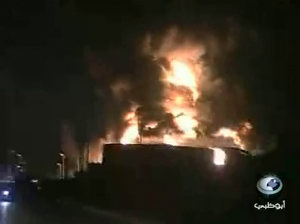Click on the image to watch the program at the Mosaic Archive. “Israel Mobilizes Towards Hezbollah Positions,” Abu Dhabi TV, UAE, Mosaic: News from the Middle East, 14 July 2006 |
It’s war again. As in the past, it’s an Israeli war in terms of the men and materiel; a joint Israeli-American war in terms of its declared and implied political aims. We must prepare for a long, bitter, and costly confrontation because the first aim of the war is to change the rules of the game — radically — in Lebanon for starters, then in its neighbor Palestine, then in the “rogue state” Syria and “rebellious” Iran.
Nothing but an excuse is the claim that this is a response to the successful capture of two Israeli soldiers by Hizballah fighters (with the aim of securing the release of Lebanese prisoners who have languished in Israeli jails for decades). The real reason for the war is the presence of the resistance, and then its influential role, not only on Lebanese politics, but on the Arab level in general and the Palestinian level in particular.
The waves of this resistance have reached out to Iraq under the American occupation, where the blood of its martyrs spelled out the invaluable lesson that only with unity could liberation be achieved. With sectarian strife comes only partition and fragmentation until the homeland disappears.
The aim of this war is to “liberate” Lebanon from the “resistance” which crossed borders and thereby provided the excuse for the American-Israeli plan to be carried out in its entirety, by resorting to the implementation of UN Resolution 1559 and by exerting pressure to implement it to the letter — that is to say, to treat the resistance as if it were some armed militia that must be disarmed . . . as a necessary first step to pushing it back from the borders, beyond the range of its missiles, and then handing over the task of guarding the “blue line” border to Lebanese government forces aided by international troops.
The American President George Bush was as clear as could be when he said he wanted to rescue the Siniora government and the Lebanese “democracy” that he regards as a personal accomplishment and to support it so that it can regain control of affairs in Lebanon. And in order for this American goal to be achieved, the resistance must fold its banners and withdraw from its land (Israel has already specified that it should be pushed 20km away from the borders), leaving the sovereignty, independence, and unity of Lebanon in the protective care of Resolution 1559 and the Israeli Defense Forces — who are so well known for their total commitment to and meticulous observance of all United Nations resolutions.
This is why the Israelis, and then the Americans, have emphasized what they call the responsibility of the Lebanese government for this “war” and the need for Lebanon to take matters in hand. In other words, they want to put the Lebanese government in the position of confronting the resistance and thereby transform the war into a civil conflict.
To make this easy for the Lebanese government, the Israeli army, with its air force, navy, and long-range artillery, have imposed a blockade on Lebanon, on the land, sea, and in the air. They shut down Beirut airport and the other old airstrips in Riyaq, al-Qali’at, and Marfa’ah. They systematically destroyed the communications network between Beirut and the southern border, blowing up bridges and launching deadly raids at numerous towns and villages that they regard as “rear bases” of the resistance.
So, it’s war, with all its agonies, human and cultural losses, with all its heavy costs (including the departure of the tourists and vacationers back to where they came from).
And then there is that new Israeli government headed by a “civilian” who needs to prove himself able to deliver victories. The opportunity for which he has been looking has now arrived whereby he can prove himself worthy of his lofty position and show that he is no less capable than those generals who preceded him, all of whom had built their glories on crushing “enemies” in Palestine and around it.
The aim is a joint American-Israeli one. And the war is a joint American-Israeli one. What they want is the head of the resistance movement, that successful example of the ability to win, that beacon whose rays reached all four corners of the Arab land, and even beyond to the neighboring areas, most of which are Islamic and are also looking for their way into the future.
Experience has shown that not everything which Israel and Washington decree in the end succeeds. It was Lebanon alone that provided the example in this context by means of its steadfastness and ability to achieve liberation and expel an occupation.
But the condition for success is to forge national unity and a cohesive leadership, one whose existence is dependent on the ability of the resistance to achieve liberation.
It’s war. The enemy has imposed it. But the potential for steadfastness is present. The resistance is there, confronting the enemy with the efficiency that we have come to trust. So, steady on.
Talal Salman is editor emeritus and publisher of the left-leaning daily As-Safir in Beirut. The original in Arabic appeared in As-Safir on 14 July 2006. Translation by Muhammad Abu Nasr.
